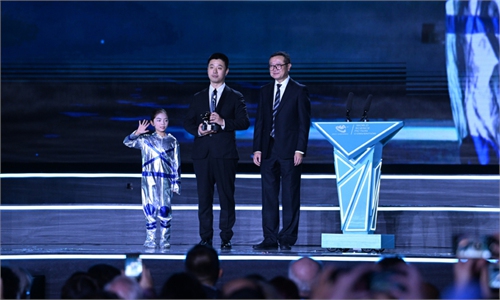ARTS / ART
China's sci-fi industry achieves historic growth
On the rise
China's sci-fi industry saw accelerated growth in 2023, generating revenue of 113.29 billion yuan ($15.94 billion), according to a report released on Saturday. The revenue represented year-on-year growth of 29.1 percent, and this is the first time the industry's annual revenue has exceeded 100 billion yuan.

Ji Shaoting, a member of the science fiction committee of the China Writers Association who attended the convention, told the Global Times on Sunday that the achievement that China's science fiction industry has made is mainly due to China's prosperous development in science and technology.
"The development of the sci-fi industry, as well as national science and technology are mutually reinforcing," she said.
Success in adaptations
China's science fiction industry has experienced rapid growth recently, fueled by a technology surge and successful film and TV adaptations of local sci-fi books. By 2023, the industry's revenue had surged to over 10 times its 2016 total, which was nearly 10 billion yuan.
According to Ji, literature, films and TV works, especially the game industry, contribute a large amount of revenue mentioned in the report.
In the film and television sector, the revenue for China's science fiction film and TV industry was 11.59 billion yuan in 2023, up 38.8 percent year-over-year. Box office sales for science fiction movies alone totaled 11.55 billion yuan, a 14.5 percent increase from the previous year. There was a notable rise in the production of science fiction web dramas and short films, as well as a significant increase in short video creations.
As for the science fiction gaming industry in China, it also saw substantial growth, generating revenues of 65.19 billion yuan in 2023, up 15.4 percent from the previous year. Sci-fi games effectively integrated with traditional Chinese culture, playing a crucial role in cultural exchanges.
"Science fiction is a world language that helps people from different cultures communicate. As more Chinese sci-fi literature and film works are released overseas, people from other countries could be able to know China and Chinese culture better," she said, adding that the mega sci-fi IPs like The Wandering Earth and The Three-Body Problem have become an ideal platform for the world to know the Chinese sci-fi industry.
In 2023, sci-fi blockbuster The Wandering Earth II, based on Liu Cixin's novel, earned over 4 billion yuan at the box office. Another novel, The Three-Body Problem by Liu, the Hugo Award winner, also turned into a highly praised TV drama.

"I don't think Chinese sci-fi is very different from its Western counterpart. Most stories from this genre focus on the big issues facing humankind - the effects of technological development on individuals and society, the place of human beings in the universe… themes that can easily transcend cultural borders. This transcendent aspect, which foreign readers can relate to regardless of their cultural backgrounds, is actually what I find most interesting about Chinese sci-fi," sinologist Agustín Alepuz Morales said. The translator of Death's End, the third novel of The Three-Body Problem also attended the convention held in Beijing.
Alepuz noted in his speech at the convention that in recent years, he has been fortunate to participate in many exchanges and disseminations of science fiction culture between China and the West. This is a journey full of passion and creativity. He sincerely hopes that through everyone's efforts, science fiction culture can build a bridge between China and the West, allowing more people to explore the infinite possibilities of the future together.
Chinese sci-fi writer Jiang Bo (pseudonym) told the Global Times on Sunday that the sci-fi industry can be seen in various industries, such as publishing, animation, and games, and it is the most creative part of every related industry, leading to a broad targeted audience that includes not only moviegoers, readers, but also anyone who is interested in the sci-fi topic.
The report further detailed that the revenue from science fiction reading in China amounted to 3.17 billion yuan in 2023, a 4.3 percent year-on-year increase. The market for printed science fiction books showed signs of recovery, with a 20 percent increase in new book sales. Digital reading continued to grow steadily, and the rate of increase for audiobook consumption accelerated.
The science fiction cultural tourism industry in China has experienced rapid growth, with revenues reaching 31.06 billion yuan in 2023, a 106.7 percent increase from the previous year, according to the report.
Jiang suggested that to conduct sci-fi education to the teens as the creative content might influence their worldview and values. Jiang and Ji both agreed that the sci-fi industry still has a large potential as the sci-fi industry is compatible with the current social development against the backdrop of the Chinese government paying greater attention to the development of aerospace science and technology.
He Junke, vice chair of the China Association for Science and Technology, said that sci-fi culture is on the rise in China.
"Chinese teenagers are showing a stronger interest in science fiction," he said at the opening ceremony of the convention. "And there is a considerable increase in the number of young sci-fi content creators."

Visitors take a picture of a robot at the eighth China Science Fiction Convention in Beijing, on April 27, 2024.Photo: Li Hao/GT
Jointly released by the China Science Fiction Research Center, and the Research Center for Science and Human Imagination at the Southern University of Science and Technology, the 2024 China Science Fiction Industry Report was unveiled to the public during the opening ceremony of the eighth China Science Fiction Convention that was held in Beijing on Saturday.Ji Shaoting, a member of the science fiction committee of the China Writers Association who attended the convention, told the Global Times on Sunday that the achievement that China's science fiction industry has made is mainly due to China's prosperous development in science and technology.
"The development of the sci-fi industry, as well as national science and technology are mutually reinforcing," she said.
Success in adaptations
China's science fiction industry has experienced rapid growth recently, fueled by a technology surge and successful film and TV adaptations of local sci-fi books. By 2023, the industry's revenue had surged to over 10 times its 2016 total, which was nearly 10 billion yuan.
According to Ji, literature, films and TV works, especially the game industry, contribute a large amount of revenue mentioned in the report.
In the film and television sector, the revenue for China's science fiction film and TV industry was 11.59 billion yuan in 2023, up 38.8 percent year-over-year. Box office sales for science fiction movies alone totaled 11.55 billion yuan, a 14.5 percent increase from the previous year. There was a notable rise in the production of science fiction web dramas and short films, as well as a significant increase in short video creations.
As for the science fiction gaming industry in China, it also saw substantial growth, generating revenues of 65.19 billion yuan in 2023, up 15.4 percent from the previous year. Sci-fi games effectively integrated with traditional Chinese culture, playing a crucial role in cultural exchanges.
"Science fiction is a world language that helps people from different cultures communicate. As more Chinese sci-fi literature and film works are released overseas, people from other countries could be able to know China and Chinese culture better," she said, adding that the mega sci-fi IPs like The Wandering Earth and The Three-Body Problem have become an ideal platform for the world to know the Chinese sci-fi industry.
In 2023, sci-fi blockbuster The Wandering Earth II, based on Liu Cixin's novel, earned over 4 billion yuan at the box office. Another novel, The Three-Body Problem by Liu, the Hugo Award winner, also turned into a highly praised TV drama.

The eighth China Science Fiction Convention is held at Beijing's Shougang Park from April 27 to 29, 2024. Photo: Li Hao/GT
A brighter prospect"I don't think Chinese sci-fi is very different from its Western counterpart. Most stories from this genre focus on the big issues facing humankind - the effects of technological development on individuals and society, the place of human beings in the universe… themes that can easily transcend cultural borders. This transcendent aspect, which foreign readers can relate to regardless of their cultural backgrounds, is actually what I find most interesting about Chinese sci-fi," sinologist Agustín Alepuz Morales said. The translator of Death's End, the third novel of The Three-Body Problem also attended the convention held in Beijing.
Alepuz noted in his speech at the convention that in recent years, he has been fortunate to participate in many exchanges and disseminations of science fiction culture between China and the West. This is a journey full of passion and creativity. He sincerely hopes that through everyone's efforts, science fiction culture can build a bridge between China and the West, allowing more people to explore the infinite possibilities of the future together.
Chinese sci-fi writer Jiang Bo (pseudonym) told the Global Times on Sunday that the sci-fi industry can be seen in various industries, such as publishing, animation, and games, and it is the most creative part of every related industry, leading to a broad targeted audience that includes not only moviegoers, readers, but also anyone who is interested in the sci-fi topic.
The report further detailed that the revenue from science fiction reading in China amounted to 3.17 billion yuan in 2023, a 4.3 percent year-on-year increase. The market for printed science fiction books showed signs of recovery, with a 20 percent increase in new book sales. Digital reading continued to grow steadily, and the rate of increase for audiobook consumption accelerated.
The science fiction cultural tourism industry in China has experienced rapid growth, with revenues reaching 31.06 billion yuan in 2023, a 106.7 percent increase from the previous year, according to the report.
Jiang suggested that to conduct sci-fi education to the teens as the creative content might influence their worldview and values. Jiang and Ji both agreed that the sci-fi industry still has a large potential as the sci-fi industry is compatible with the current social development against the backdrop of the Chinese government paying greater attention to the development of aerospace science and technology.
He Junke, vice chair of the China Association for Science and Technology, said that sci-fi culture is on the rise in China.
"Chinese teenagers are showing a stronger interest in science fiction," he said at the opening ceremony of the convention. "And there is a considerable increase in the number of young sci-fi content creators."






